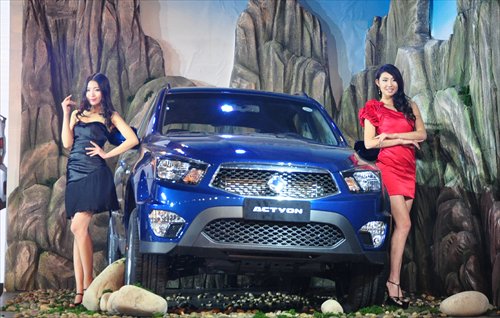SUV Battlefield

Models pose with a SsangYong ActYon SUV on March 7 in Beijing. Photo: Liang Fei/GT
South Korean carmaker SsangYong Motor Co and Chinese automotive retailer Pang Da Automobile Trade Co unveiled their new sport utility vehicle (SUV) on March 7 as explosive growth in the China market encourages increasing numbers of automakers, niche and global, to chance their arm.
The SUV market grew more than 49 percent year-on-year in 2013, according to China Automobile Association statistics, making SsangYong and Pang Da upbeat about their new ActYon SUV.
Distributor Pang Da has experience promoting Subaru, once almost unknown in China. proven success with the Japanese auto brand is one reason Pang Da is so confident.
"I believe we have a better foundation compared with the situation when Subaru first came to China," Liu Hongwei, deputy general manager at Pang Da, said at the press conference on March 7.
Pang Da has about 150 SsangYong dealers in China, Liu said, and another 30 are expected to kick off before the end of this year.
SsangYong shared distribution with Subaru until January 2013 when SsangYong separated off and formed its own sales channel and dealer network, the 21st Century Business Herald reported on February 26.
The ActYon has a gasoline engine, designed to appeal to Chinese drivers who don't like diesel so much. Before the ActYon, only the Korando came with a gasoline engine.
Said to be China's largest publicly traded automobile distributor with more than 1,100 dealerships, Pang Da received extensive attention in 2011 for its failed attempted takeover of Swedish carmaker Saab.
Pang Da may repeat its success with Subaru, some media commentators suggested, but industry analysts remained coolheaded, noting that competition is growing as fast as the crazy sales in this sector.
Not so rosy
Shanghai-based SAIC Motor bought a 48.9 percent stake in SsangYong for $500 million in 2004. But even though SAIC Motor reportedly poured more than $500 million into the company, the cooperation did not work well and ended in 2011.
Indian automaker Mahindra & Mahindra bought SsangYong in February 2011.
SsangYong turned to Pang Da four months later, hoping its new partner could strengthen its foothold in the fast-growing Chinese market.
The South Korean company sold about 6,000 units in China in 2013, said the 21st Century Business Herald report, citing Liu Hongwei. SsangYong expects about 20,000 units this year, Executive Vice President Choi Johng-sik said at the press conference.
Priced between 154,800 yuan ($25,216) and 219,800 yuan, the ActYon will compete with Honda's CR-V, Volkswagen's Tiguan and Hyundai Motor's iX35, said Wang Zhihong, vice general manager at SsangYong Motor (Shanghai) Co.
The Tiguan and CR-V rank second and third in China sales in 2013, prompting industry insiders and experts to suggest SsangYong may struggle to compete with major players.
"It's likely that the company can sell 20,000 units in China this year, given that the vehicle is wholly imported and the price is reasonable," said Zhang Yu, managing director of Shanghai consultancy Automotive Foresight Co, "but it would be hard for SsangYong to reach a higher number."
While Subaru's rapid development was achieved through high-quality products and advanced technology, Zhang told the Global Times on Monday, SsangYong's technology and product line aren't as competitive.
Booming market
The race is on. China sold more than 3 million SUVs in 2013, Zhang said, and the market will probably grow more than 30 percent in 2014.
General Motors plans to introduce nine new or refreshed SUVs in China in the next five years.
Volkswagen said it would introduce four in the next three years and Jaguar Land Rover is localizing production in China. Media recently reported its plant in Changshu, East China's Jiangsu Province, will roll out its first locally produced model in July.
Great Wall Motor's Haval H6 topped SUV sales in 2013, and the CS75 SUV from Changan Automobile Group, expected to be launched in a few months, is expected to be a strong competitor.
SsangYong's brand recognition still lags behind its competitors in China, Wang Zhihong said, but the company would try to catch up through a renewed product line and expanded distribution network.
Lesser-known niche brands like SsangYong face intense competition from homegrown rivals and foreign brands, "and the landscape is not easily changed in the short term," Zeng Zhiling, general manager at automobile consultancy LMC Automotive, told the Global Times.